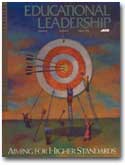With knowledge doubling every five years—every 73 days by the year 2020—we can no longer attempt to anticipate future information requirements. If students are to keep pace with the rapid increase in knowledge, we cannot continue to organize curriculum in discrete compartments, as Descartes conceived of knowledge more than 350 years ago—and the way Matthew Gandal thinks it should be today.
Why Content-Driven Curriculum Is Passé
First, the disciplines, as we have known them, no longer exist. They are being replaced by human inquiry that draws upon generalized, transdisciplinary bodies of knowledge and relationships. Researchers today are searching for patterns in the chaos of minds, machines, animals, and societies in order to discover important connections.
Second, curriculum, based on discrete disciplines, emerged from a largely male- and western-oriented way of thinking. As we learn to listen to the female voice, gain greater understanding of the perspectives of indigenous peoples, and become more global, our curriculum will need to reflect richer views of how humans construct meaning (Pinar et al. 1994).
Another reason to emphasize process is that when content is presented as an existing body of knowledge, students may be deceived into thinking that they cannot construct meaning for themselves. Learners need to discover that they can be self-referencing, self-initiating, and self-evaluating—that their capacity to comprehend comes from within.
Immersion in a discipline does not necessarily result in the ability to apply concepts and principles to everyday situations. Separation of the disciplines produces episodic learning, the purpose of which is perceived as passing a test, rather than accumulating wisdom and personal meaning.
Evidently, Gandal subscribes to the “Bo-Peep” theory of transfer (Perkins and Saloman 1991), when he states that “moral education is a natural by-product of good curriculum.” It is not the case that “left alone,” one naturally follows the other. The moral implications of curriculum require mediation by a skillful teacher.
Further, when students learn individual parts of content, they inevitably lose sight of the beauty, interconnectedness, and spirituality in the world. Quality not quantity is what is important. Our challenge as educators is to illuminate that which, at first, might seem impossible to comprehend but that, on further inquiry, can be joyfully understood.
An Alternative: Process as Content
We agree that many published standards are vague, but Gandal dismisses process education as fuzzy thinking. Real life, however, demands processes and content—including the need for communication, decision making, systems thinking, teamwork, and lifelong learning (SCANS 1992, Conference Board of Canada 1992, Liebmann 1993).
We must stop valuing right answers and begin to learn how to behave when confronted with paradoxical and ambiguous situations. Doing so requires a shift from valuing knowledge acquisition to valuing knowledge production (Costa and Liebmann, in press).
We must have something to process, however. Our recommendation is not that content be devalued but, rather, that content be rethought as means, not ends. We must value content because it enhances the development of processes, and judiciously select content because of its generative qualities. Through content we experience the euphoria of knowledge production, the revelation of our own efficacy as continual learners, the application of learning to other settings, and the expansion of our repertoire of response patterns. As Parker and Rubin (1966) stated so well, Process ... is, in fact, the highest form of content and the most appropriate base for curriculum change. It is in the teaching of process that we can best portray learning as a perpetual endeavor and not something which terminates with the end of school.
